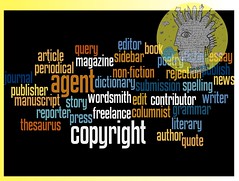 [/caption]
[/caption]Tomorrow, I'm teaching another workshop about digital publishing. Specifically, I'll be guiding a small class through a sort of aptitude test, helping them find their strengths and showing them how they line up with various promotional efforts. Yes, that sounds very amorphous, but it's based on solid business acumen I learned from Barbara Weaver Smith. She's the founder of The Whale Hunters, an internationally respected sales training organization. No, I have no interest in making authors into salespeople. That's someone else's job. But her lessons on key account planning inspired my workshop on helping authors choose the right "platform" with which to reach their audience. I call it Platform Building Tools and Techniques for Authors in a Digital World.
It's generally accepted that authors today must have a "platform" to help them build, communicate to and connect with their audience. It is through this platform that audience members make their decisions to buy one or more books (or other products) from an author. This platform isn't a technological build -- it's the new name for an activated and motivated audience.
There are many ways authors can build a platform. Some do it by blogging. Some do it by podcasting. Others with an active social media presence, and many prefer to "press the flesh" in person. I've identified 24different ways in which authors can build a platform. And that's just getting started. Some work better than others, but don't rush to jump on the one that is the most successful. You're missing an important part of the equation: you.
Your ability to build and leverage the "platform" matters. Complexity for you personally must be a consideration, as is your own aptitude. Without the skills and understanding necessary to implement, even the most successful technique will fall flat. So rather than expending resources on something that doesn't work for you, this workshop helps you pick something you can do that will work for you. Once you've taken care of that, then you can start acquiring the skills to take on the rest of the techniques.
That's what I'm teaching tomorrow at Changing Hands bookstore in Tempe from 6:30p - 8:30p. I know this is rather short notice, but there's only limited room, and I don't want to overload them. When I taught this class two months ago it was full without me mentioning anything. Give them a call at 480-730-0205 and see if there are spots still available. I'd love to see you there!

